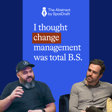
Building, leading, and scaling legal teams | Bonus Episode
How do you build and scale a high-performing legal team?
Beyond legal prowess, GCs must master leadership, finding and retaining the right talent, allocating resources and advocating for budget, and more. Join us as we dive into intriguing stories and advice shared by top leaders in the in-house legal industry.
Read detailed summary: https://www.spotdraft.com/podcast/episode-24
Topics
Introduction: 00:00
David Lancelot on transforming processes to empower lawyers as strategic leaders: 01:46
Gary Spiegel on hiring adaptable players and fostering a growth-oriented culture: 08:17
Brian Chase on allocating resources strategically and nurturing talent: 13:41
Akshay Verma on how well-being and values contribute to professional success: 20:03
Adam Glick on strategic hiring for expertise and problem-solving skills: 22:17
Celaena Powder on team success through coaching, brand building, and open culture: 30:38
Lydia Chuek on demonstrating trust in employees and retaining great legal talent: 34:00
Seth Weissman on developing trust and leadership synergy within teams: 36:56
Subscribe to be the first to know when we release new episodes.
Connect with us:
Tyler Finn - https://www.linkedin.com/in/tylerhfinn
SpotDraft - https://www.linkedin.com/company/spotdraft
Featured guests:
David Lancelot - https://www.linkedin.com/in/davidlancelot/
Gary Spiegel - https://www.linkedin.com/in/gspieg/
Brian Chase - https://www.linkedin.com/in/brian-r-chase/
Akshay Verma - https://www.linkedin.com/in/akshay-verma-esq/
Adam Glick - https://www.linkedin.com/in/adglick/
Celaena Powder - https://www.linkedin.com/in/celaenapowder/
Lydia Cheuk - https://www.linkedin.com/in/lydiacheuk/
Seth Weissman - https://www.linkedin.com/in/sethweissman/



















